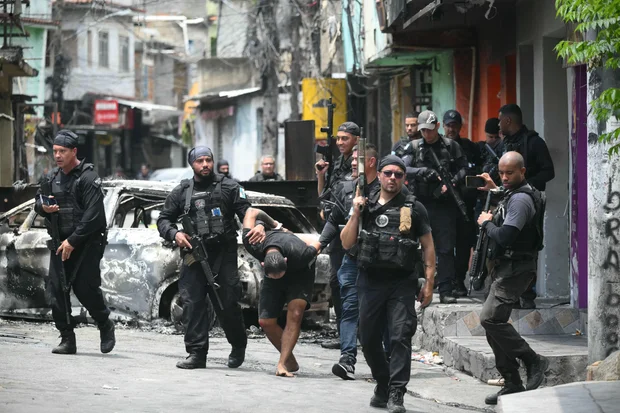A large-scale security raid in Rio de Janeiro has left dozens dead and reignited debate over police violence, human rights, and the government’s ongoing battle with powerful criminal organizations.
Brazilian authorities launched an extensive operation targeting drug gangs in the city’s northern favelas, resulting in at least 64 deaths, including four police officers. More than 80 people were arrested, and a huge cache of weapons and narcotics was seized. Officials said the operation aimed to dismantle the notorious Red Command gang, one of Brazil’s most powerful criminal networks.
The raid, involving more than 2,500 officers and military support, unfolded across several densely populated neighborhoods, including Complexo do Alemão and Penha. Residents described a chaotic scene of gunfire, explosions, and helicopters circling overhead. Armored vehicles rolled through narrow streets as security forces clashed with heavily armed gang members.
Authorities reported recovering nearly 100 rifles and large amounts of ammunition and drugs. State officials said the gangs used drones to drop explosives during the confrontation — a rare and alarming escalation that authorities labeled an act of “narco-terrorism.”
While government officials praised the raid as a decisive blow against organized crime, human rights advocates condemned it as one of the deadliest police actions in Rio’s recent history. Critics argue that such large-scale raids often result in the deaths of poor residents caught in the crossfire, while failing to dismantle the deeper structures of criminal control within the favelas.
Local and international observers have expressed concern over the growing normalization of extreme police tactics in Brazil’s urban centers. Many accuse authorities of resorting to excessive force without accountability, particularly in marginalized communities. Calls for an independent investigation into the operation are mounting, with civil rights groups demanding transparency about how so many lives were lost.
Residents described terrifying moments as gunfire echoed through their neighborhoods. Schools and businesses were forced to close, and public transportation was suspended. Several buses were reportedly hijacked and burned by gang members in retaliation, further paralyzing the city’s northern zones.
Security analysts warn that despite the scale of the operation, such raids may offer only short-term relief. They argue that without addressing the social inequalities that fuel gang recruitment, violence will continue to erupt in Rio’s poorest areas. Experts have emphasized that long-term safety requires investments in education, employment, and infrastructure — not just force.
For now, the streets of Rio remain tense. Police continue to patrol the favelas, and families are still searching for missing loved ones. The tragedy has once again placed Brazil’s struggle between law enforcement and organized crime at the center of global attention — a grim reminder of how deeply violence and inequality are intertwined in the city’s fabric.
















Leave a Reply